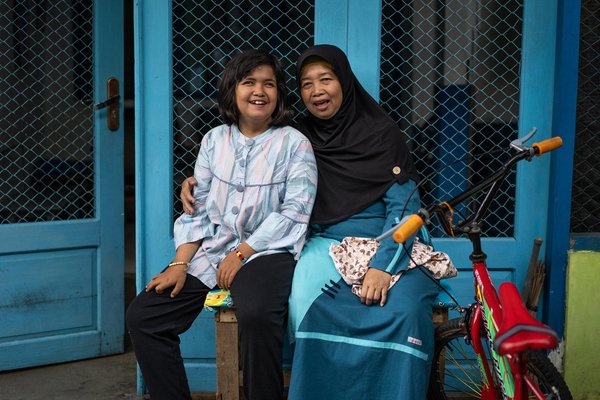Knowing your rights
Your child’s rights are protected under many international documents called treaties.
These treaties include the Convention on the Rights of Persons with Disabilities (CRPD, 2006), the Convention on the Rights of the Child (CRC, 1989), the Convention on the Elimination of All Forms of Discrimination Against Women (CEDAW, 1979) among others. Together they embody four core values of human rights law that are of particular importance in the context of disability:
- the dignity of each individual, who is deemed to be of inestimable value because of his/her inherent self-worth, and not because s/he is economically or otherwise ‘useful’;
- the concept of autonomy or self-determination, which is based on the presumption of a capacity for self-directed action and behaviour, and requires that the person be placed at the centre of all decisions affecting him/her;
- the inherent equality of all regardless of difference;
- the ethic of solidarity, which requires society to sustain the freedom of the person with appropriate social support.
Most countries also have laws and anti-discriminatory policies which protect the rights of children with disabilities and create relevant support programmes and services.
It could be an Anti-discrimination law, Disability Act, Education Act or Inclusive education programme. (Please include key national legislation that operationalized the CRPD in your country, also be familiar with concluding observations of the UN as they include key recommendations that will help with strategic planning any activities)
As a parent or caretaker of a child with disabilities, you are your child’s biggest advocate.
It is important for you to be equipped with the right knowledge so you can ensure their rights are protected and fulfilled.

Your government may have ratified one or more of these treaties, which makes them responsible for creating conditions, services and programmes and remove barriers so that all children, including those with disabilities, have adequate conditions to access services and reach their full potential. Knowing about these commitments and the national/local legal and regulatory framework can equip families of children with disabilities with the needed knowledge to demand the realization of their children’s rights and hold national and local stakeholders accountable (You learn more about the treaties ratified by your country by using this the UN Treaty Body Database
If your government has ratified the CRPD and/or the CRC, it means that your government has a duty to make sure the rights of persons with disabilities, including children with disabilities are protected and upheld.
The CRPD talks about the roles of and protection for parents, family members, and caregivers of persons with disabilities. Here are some relevant passages from the Convention on the Rights of Persons with Disabilities (2006)
- Preamble (x): “[…] persons with disabilities and their family members should receive the necessary protection and assistance to enable families to contribute towards the full and equal enjoyment of the rights of persons with disabilities.”
- Article 7: “In all actions concerning children with disabilities, the best interests of the child shall be a primary consideration.”
- Article 16.2: “States Parties shall also take all appropriate measures to prevent all forms of exploitation, violence and abuse by ensuring, inter alia, appropriate forms of gender and age-sensitive assistance and support for persons with disabilities and their families and caregivers.”
- Article 24: “States Parties recognize the right of persons with disabilities to education. With a view to realizing this right without discrimination and on the basis of equal opportunity, States Parties shall ensure an inclusive education system at all levels and life-long learning…”
- Article 25 23.2: “Provide those health services […] early identification and intervention as appropriate, and services designed to minimize and prevent further disabilities.”
- Article 26.3: “States Parties shall promote the availability, knowledge and use of assistive devices and technologies, designed for persons with disabilities, as they relate to habilitation and rehabilitation.”
- Article 28 28.2(c): “To ensure access by persons with disabilities and their families living in situations of poverty to assistance from the State with disability-related expenses, including adequate training, counselling, financial assistance and respite care.”
With regards to the Convention of the Child, two articles in particular render children with disabilities visible and place explicit obligations on States to introduce measures to promote inclusion and freedom from discrimination:
- Article 2 states that “no child should encounter discrimination on the grounds of race, colour, sex, language, religion, political or other opinion, national, ethnic or social origin, property, disability, birth or other status” The CRC was the first human rights treaty to include disability as a ground for protection from discrimination. It therefore broke new ground, establishing the right to protection, and imposing obligations on States to take all necessary measures to ensure that protection for all children with disabilities.
- Article 23 is a provision dedicated to children with disabilities and emphasizes their right to a “full and decent life in conditions which ensure dignity, promote self-reliance and facilitate the child’s active participation in the community”. It imposes obligations on States to provide special care and assistance to enable the child to achieve the “fullest possible social integration and individual development, including his or her spiritual or cultural development”.
It is important to be familiar with local legal frameworks that may relate to social protection, health and education rights of children with disabilities and their families and the obligations and responsibilities of different national and local stakeholders to ensure and protect those rights. Get in touch with peer groups of parents of children with disabilities to learn more about the legal system, rights and entitlements and available services in your country.

